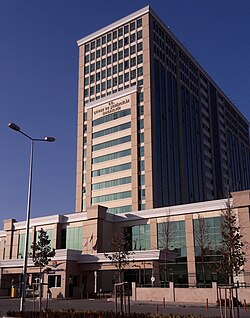 |
|---|
The ministries of Turkey are the most influential part of the executive branch of the Turkish government. Each ministry is headed by a minister appointed by the President. Currently there are 17 ministries.
 |
|---|
The ministries of Turkey are the most influential part of the executive branch of the Turkish government. Each ministry is headed by a minister appointed by the President. Currently there are 17 ministries.

| 1920s | 1930s | 1940s | 1950s | 1960s | 1970s | 1980s | 1990s | 2000s | 2010s | 2020s [1] | ||
|---|---|---|---|---|---|---|---|---|---|---|---|---|
| Foreign Affairs (1920–) | ||||||||||||
| Health (1920–) | ||||||||||||
| Interior (1920–) | ||||||||||||
| National Defense (1920–) | ||||||||||||
| Justice (1923–) | ||||||||||||
| National Education (1923–1983) | National Education, Youth and Sports (1983–1989) | National Education (1989–) | ||||||||||
| N/A | Youth and Sports (1969–1983) | Minister of State (Responsible for Youth and Sports) (1989–2011) | Youth and Sports (2011–) | |||||||||
| N/A | Press-Publication and Tourism (1957–1963) | Tourism and Publicity (1963–1981) | Culture and Tourism (1981–1989) | Tourism (1989–2003) | Culture and Tourism (2003–) | |||||||
| Culture (1971–1981) | Culture (1989–2003) | |||||||||||
| N/A | Energy and Natural Resources (1963–) | |||||||||||
| Public Works (1920–1983) | Public Works and Housing (1983–2011) | Environment and Urban Planning (2011–2021) | Environment, Urbanisation and Climate Change (2021–) | |||||||||
| N/A | Development and Housing (1958–1983) | |||||||||||
| N/A | Environment (1991–2003) | Environment and Forest (2003–2011) | Forest and Water Management (2011–2018) | Agriculture and Forestry (2018–) | ||||||||
| N/A | Forestry (1960–1980) | Agriculture and Forestry (1980–1983) | Agriculture, Forestry and Rural Affairs (1983–1991) | Forestry (1991–2003) | ||||||||
| Agriculture (1923–1974) | Food, Agriculture and Livestock (1974–1980) | Agriculture and Rural Affairs (1991–2011) | Food, Agriculture and Livestock (2011–2018) | |||||||||
| Rural Affairs (1963–1974) | Rural Affairs and Cooperatives (1974–1983) | |||||||||||
| Finance (1923–1983) | Finance and Customs (1983–1993) | Finance (1993–2018) | Treasury and Finance (2018–) | |||||||||
| N/A | Customs and Monopoly (1931–1983) | Minister of State (Responsible for Customs) (1993–2011) | Customs and Trade (2011–2018) | Trade (2018–) | ||||||||
| Trade (1924–1928) | Trade (1939–1949) | Economy and Trade (1949–1960) | Trade (1960–1971) | External Economic Affairs (1971) | Trade (1971–1983) | Industry and Trade (1983–2011) | Economy (2011–2018) | |||||
| N/A | Industry (1949–1971) | Industry and Technology (1971–1983) | Science, Industry and Technology (2011–2018) | Industry and Technology (2018–-) | ||||||||
| N/A | Labour (1946–1983) | Labour and Social Security (1983–2018) | Family, Labour and Social Services (2018–2021) | Labour and Social Security (2021–) | ||||||||
| N/A | Social Security (1974–1983) | |||||||||||
| N/A | Minister of State (Responsible for Women and Family Affairs) (1991–2011) | Family and Social Policy (2011–2018) | Family and Social Services (2021–) | |||||||||
| N/A | Transport (1939–2011) | Transport, Maritime and Communication (2011–2018) | Transport and Infrastructure (2018–) | |||||||||

Former: